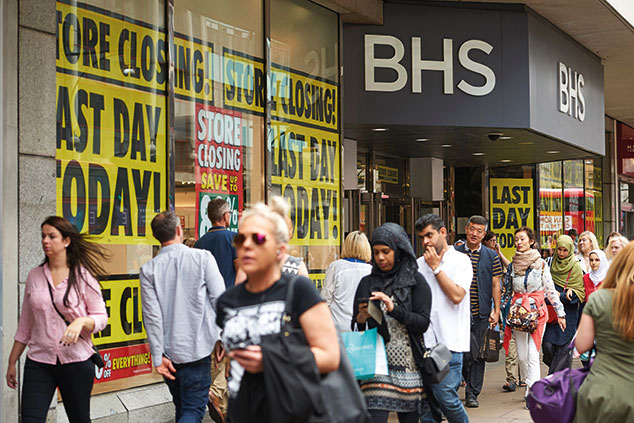
Final-salary schemes have plugged their deficits. But it’s not all good news.
Defined-benefit (DB) pension schemes may not be in as much trouble as previously thought. These schemes, which offer guaranteed pensions based on members’ lifetime earnings, have become a dying breed in recent years as employers baulk at the cost of meeting their pension promises. But by the end of 2017, the DB schemes of FTSE 100 companies were £4bn in surplus, says actuarial firm Lane Clark & Peacock. The company also estimates that by the end of last month, the surplus had reached £20bn.
It’s the first time the schemes have recorded a surplus since 2007, and it’s a remarkable turnaround from 2016’s year-end, when the same schemes had a deficit of £31bn. What drove the recovery? Companies paid in £13bn to the schemes (down from £17.3bn in 2016); financial markets did well (so investments grew); life expectancy dipped (so pensions won’t have to pay out as much over time); and interest rates headed higher, which meant the value of future liabilities fell.
Don’t celebrate yet
Employers are not out of the woods yet. For one thing, given the wide range of assumptions involved, these figures can change very rapidly, as last year’s huge swing from deficit to surplus shows. Moreover, Lane Clark & Peacock’s data shows the value of deficits and surpluses measured on an “accounting basis” – the pension figure recorded in the company accounts – rather than a “funding basis”, where schemes are still heavily in deficit. The latter measure is what the Pension Regulator looks at when assessing whether employers are funding their schemes properly.
At financially sound companies the accounting basis gives a good indication of the long-term health of the scheme. The funding basis, by contrast, is much tougher; it looks at whether schemes would have sufficient assets to pay out the pension promises made if these all fell due today. This is what is required if a business fails and there is no employer to stand behind the pension promises.
This is pertinent given that – in the wake of high-profile collapses such as Carillion and BHS – the regulator has pointed out that it will be keeping an eye on companies that continue to pay healthy dividends while neglecting to plug large deficits. In all, it’s good that deficits are going in the right direction – but don’t expect the issue to vanish soon.
Thousands ditch defined benefits
A record 92,000 savers moved £20.8bn out of defined-benefit (DB) pension plans during 2017, up from £7.9bn moved by 61,000 savers in 2016, according to the Financial Conduct Authority (FCA). The regulator has warned that savers who leave DB plans will rarely be better off doing so, even though many schemes have offered generous transfer values. In an effort to protect savers, transfers of benefits worth more than £30,000 are banned unless the saver takes financial advice first.
Transfer values have been particularly high recently for the same reason that pension deficits have grown – very low interest rates have driven up the value of future liabilities. Pensions freedoms have also made it easier to access defined-contribution pensions, which may also tempt savers to transfer. The FCA is now investigating whether advisers have given savers (including Port Talbot steelworkers) poor advice to earn high transfer fees.
Tax tip of the week
If the property or properties you let out are fully furnished, you used to be able to claim a 10% allowance for wear and tear of furnishings, notes Tom Wilson on Which?. However, from 6 April 2016, this allowance was scrapped. Now you can only claim tax relief on anything you spend on replacing what the tax office labels as a “domestic item”. This only applies to replacement items (so you can’t claim tax relief on the actual cost of kitting out a property for the first time). And it only applies when an item is genuinely replaced and is no longer used in the property.
On the list of items that qualify for this relief are beds, carpets, crockery or cutlery, curtains, sofas, and goods such as fridges or washing machines. Note that you can only claim for a like-for-like replacement; and you can also claim for the cost of disposing of items (ie, electrical goods).
HSBC under pressure on pensions clawback
Following a campaign led by the union Unite, MPs sitting on the cross-party Work and Pensions select committee have added to the pressure on HSBC to reconsider a controversial feature of its occupational pension scheme, saying they will continue to “monitor” the scheme.
The “clawback” feature was common practice at pension schemes for much of the second half of the 20th century, although it has since fallen out of use. This gave pension-scheme members the option of paying in smaller contributions in return for accepting that they would receive lower pensions once their state benefits became available. Those retiring prior to state pension age therefore see their income from the scheme adjusted downwards once their state benefits kick in.
However, HSBC pension-scheme members affected by the clawback have told MPs that they didn’t realise they had signed up to this feature – for many, the first they hear about clawback is when their benefits are cut.
In the past, legal challenges against clawback – which have been fought on the basis that it disproportionately penalises those with smaller pensions – have failed. The government has also ruled out legislating to end the practice, arguing that employers should be able to decide for themselves whether to apply their historic scheme rules. Some schemes have chosen not to apply clawback, or decided to limit the reduction to a token amount.